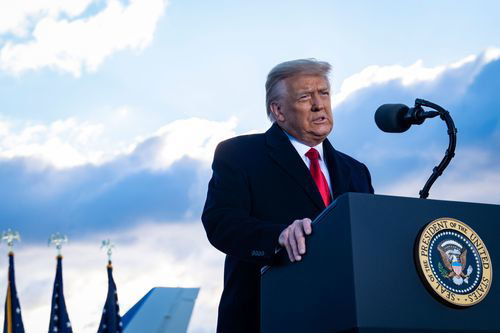Why the Supreme Court didn’t want to hear the Trump emoluments cases and what it means going forward

Early in the Trump administration, a novel dispute arose concerning whether the President had violated the Constitution by illegally profiting from his business ventures while in public office.
It triggered a fierce debate about a provision of the Constitution that most lawyers knew little about and laymen couldn’t pronounce: The Emoluments Clause.
But on Monday, with President Donald Trump no longer in office, the dispute fizzled. That’s because the Supreme Court dismissed the two cases in front of it and wiped away appeals court opinions that went against the former President because he is no longer in office.
The court’s action raises the question of how the justices will deal with a myriad of other lawsuits and disputes concerning the now-former President, and whether Trump’s side may prevail simply because he ran out the clock and courts allowed him to do so.
One emoluments case was originally brought by lawyers for Washington, DC, and Maryland, who argued Trump violated the Constitution by accepting payments from foreign and domestic governments through the Trump International Hotel. Another was brought by various members of the hospitality industry who own or work in hotels and restaurants who argued they were also at a competitive disadvantage because Trump had not used a blind trust when he assumed the presidency but instead continued to retain an interest in his businesses.
In dismissing the lawsuits Monday, no justice noted a dissent suggesting they all believed that there was no case or controversy remaining because Trump is no longer in office.
Although the case at hand died and appeals court opinions that went against the President were vacated, DC Attorney General Karl Racine, who was behind one of the challenges, said all was not lost for his side.
“Our lawsuit demonstrated for the first time that the Emoluments Clauses, centuries-old anti-corruption protections embedded in the Constitution, can be enforced and that those clauses mean federal officials cannot accept anything of value from foreign or domestic governments,” Racine said.
“The Supreme Court’s decision,” he added, which wiped away an appeals court opinion, “did not disturb the landmark district court decisions establishing this critical precedent.”
But still, subpoenas that would have gone forward to explore some of Trump’s financial dealings will now not go forward.
That will come as a relief for some federal judges on the 4th US Circuit Court of Appeals who dissented months ago when the lawsuit was allowed to proceed calling it a “litigative assault upon this and future presidents.”
Whether the judge, J. Harvie Wilkinson, was correct, is now an open question waiting for a similar dispute that may never come.
Trump’s Twitter account
The justices haven’t acted yet on a case concerning whether Trump violated the First Amendment back in 2017 when he blocked followers from his Twitter account. Just before leaving office, Trump’s Justice Department argued the dispute should be considered moot and a lower court opinion that went against Trump should be wiped away under the same legal doctrine the court cited in vacating the emoluments cases.
But John Elwood of Arnold & Porter, who argues frequently before the Supreme Court, suggested in his own Twitter feed that even without Trump in office (or even on Twitter at this point), the court may choose not to vacate a lower court opinion that went against Trump because President Joe Biden also has a personal account. Elwood suggested that there may still be a case or controversy in play as it impacts other government officials and that the justices may leave the lower court opinion that went against Trump on the books.
“Given unsettled questions, [there] may be some reluctance to let [the] Executive Branch eliminate adverse precedent,” Elwood tweeted.
Future presidents, of course, will likely have Twitter and other social media accounts.
Katie Fallow, an attorney at the Knight First Amendment Institute that sued Trump, also said that the case was moot. But she made that argument based on the fact that Trump’s “repeated violations” of Twitter’s terms of service led the company to eventually shut down his account. She told the justices in a filing that they should not vacate the appeals court decision.
“Here, the public interest in preventing impermissible viewpoint discrimination in government-operated social media accounts weighs heavily in favor of keeping the Second Circuit’s judgment in place,” Fallow wrote in court papers.
The court also didn’t act Monday on cases concerning Trump policies dealing with immigration and abortion referrals, among other issues. Those fall into a different category, because the Biden administration may rescind the rules and regulations at hand.
But a high-profile case the justices have been sitting on since October deals with an issue that is critical to Trump. His personal lawyers asked the justices to put on hold a lower court opinion that allowed a subpoena for his tax records to go forward in an investigation being run by a New York prosecutor. The justices have so far said nothing, and now, Trump is no longer in the White House. The court could have acted while Trump was President, but chose not to do so.
Did Trump successfully run out the clock? He may have outrun one clock, but the justices are well aware of something else. The Manhattan prosecutor may ultimately prevail in his objective of obtaining the documents, now that Trump is simply an ordinary citizen.